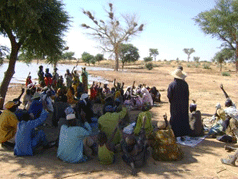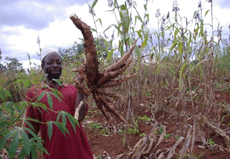Development of technologies for sustainable agricultural production in the African savanna
2025-08-04
Today, it is a global and urgent issue to increase agricultural productivity of sub-Saharan Africa although the situation is variable in different regions. In this project, we research to solve specific problems in the three regions.
In West Africa, severe soil erosion and low soil fertility are important issues. We aim to develop a conservation agriculture-based cropping system to solve them. Conservation agriculture is a concept that aims to control soil erosion caused by wind and rain and to improve soil fertility through minimum soil disturbance, crop residue mulching and other techniques. Based on this concept, we shall try to establish locally promising cropping systems from Ghana to Burkina Faso.
The Sahel region in the southern part of the Sahara desert is a semi-arid region with around 300-600 mm of rainfall in its only rainy season, but has some available water which has not been used sufficiently. This project tackles to promote the dry season vegetable cultivation techniques in Niger by using existing water resources in natural swamps that have not been so far used effectively.


